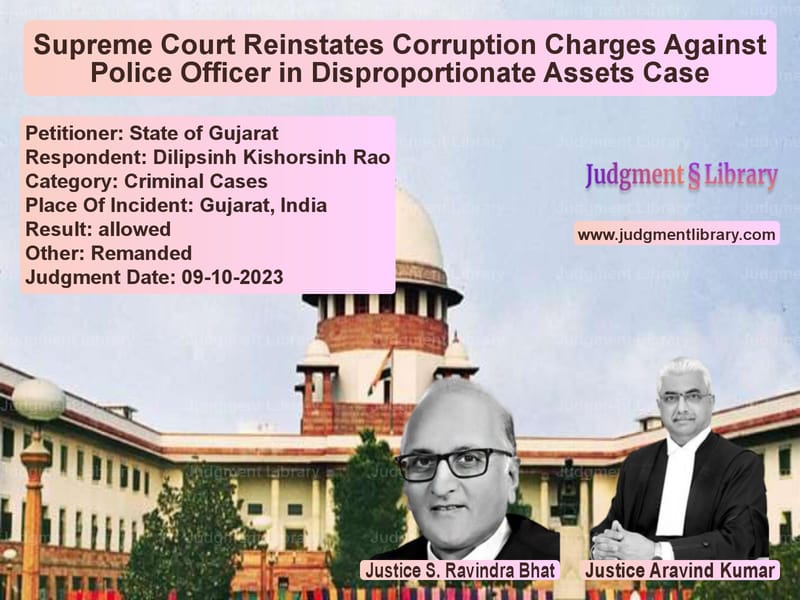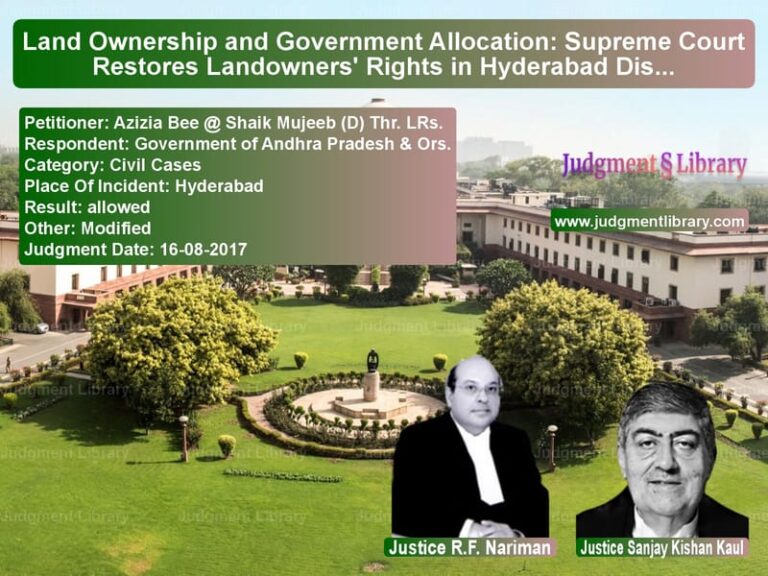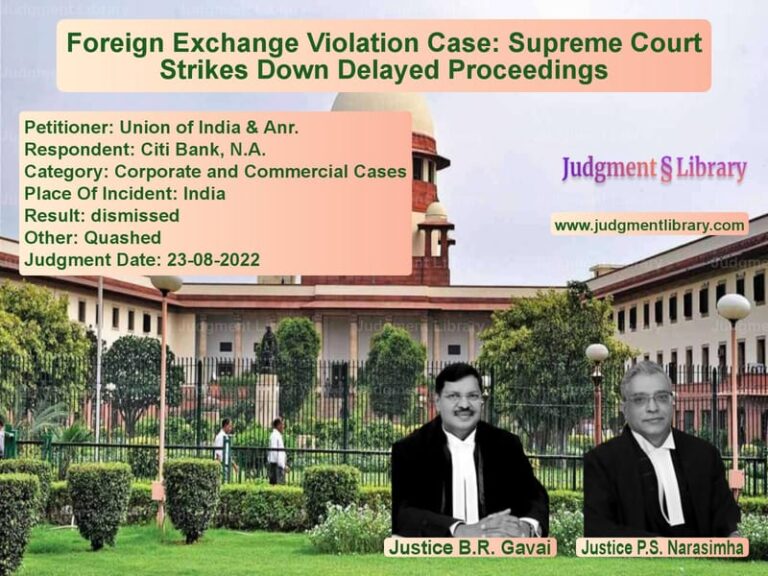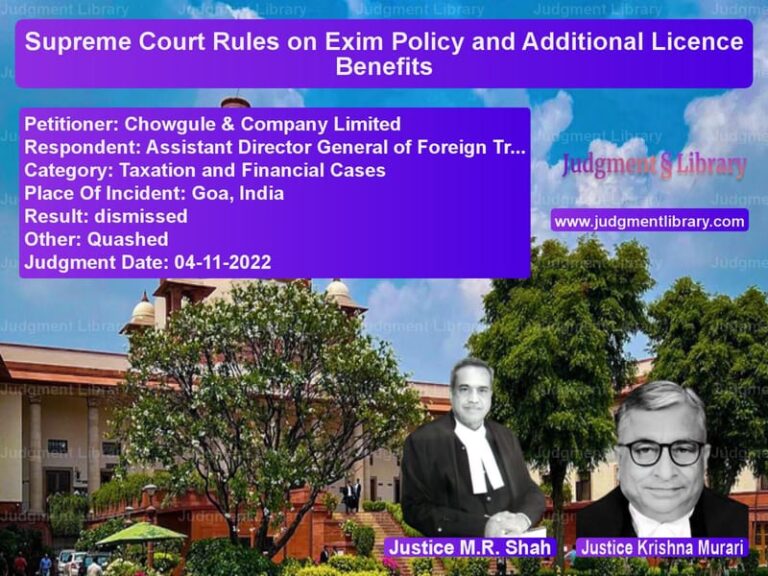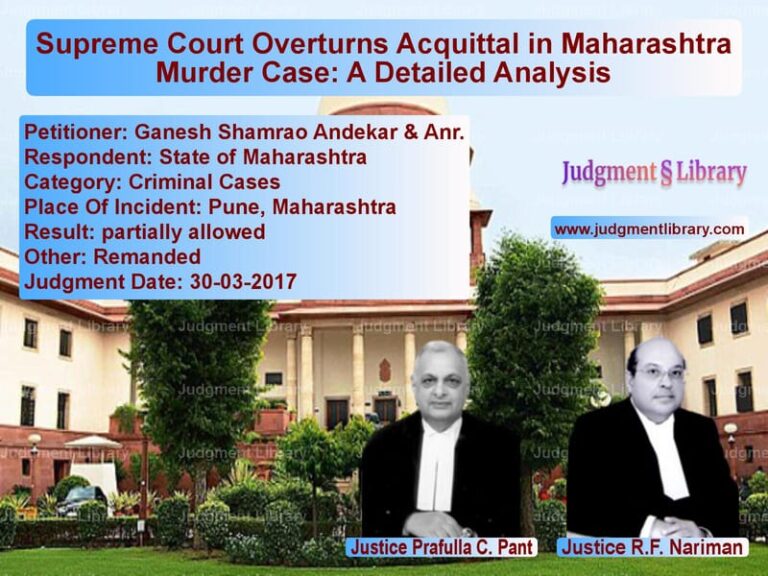Supreme Court Reinstates Corruption Charges Against Police Officer in Disproportionate Assets Case
The Supreme Court of India recently ruled in State of Gujarat v. Dilipsinh Kishorsinh Rao, setting aside a High Court order that discharged a police officer accused of accumulating assets disproportionate to his known sources of income. The judgment reinstates the criminal proceedings, emphasizing that cases under the Prevention of Corruption Act, 1988 must be decided based on a full-fledged trial rather than at the preliminary stage of framing charges.
Background of the Case
The case revolves around an investigation conducted by the Anti-Corruption Bureau (ACB) in Gujarat against the respondent, Dilipsinh Kishorsinh Rao, who served as a Sub-Inspector at Borsad Town Police Station. The ACB alleged that between 2005 and 2011, the respondent had amassed assets disproportionate to his known income.
Key allegations in the charge sheet:
- The respondent had acquired assets worth ₹1,15,35,319, which were beyond his known sources of income.
- The disproportionate amount was calculated at ₹32,68,258, exceeding 40% of his known income.
- He allegedly misused his position for personal financial gains.
The investigating officer (IO) prepared a charge sheet against the respondent, and a sanction to prosecute was obtained from the competent authority. The accused then moved an application for discharge under Section 227 of the Code of Criminal Procedure (CrPC), arguing that:
- The IO failed to consider his written explanations regarding his financial transactions.
- The authorities did not account for sanctioned loans and financial assistance from family members.
- The sanctioning authority acted without applying its mind.
The trial court rejected the discharge application, stating that there was sufficient material to proceed with the case. However, the respondent challenged this decision before the Gujarat High Court, which set aside the trial court’s ruling and discharged him.
The State of Gujarat then appealed to the Supreme Court.
Legal Issues Raised
- Whether the High Court had exceeded its jurisdiction under Section 397 CrPC by re-evaluating evidence at the discharge stage.
- Whether the trial court was correct in holding that the case should proceed to trial.
- Whether the defense’s claims about sanctioned loans and financial aid from family members should be assessed during trial rather than at the discharge stage.
Arguments by the Appellant (State of Gujarat)
- The High Court wrongly accepted the accused’s claims about financial transactions without a full trial.
- The trial court had correctly found sufficient material in the charge sheet to proceed with prosecution.
- At the stage of framing charges, the prima facie standard should be applied rather than a full-fledged examination of evidence.
- The High Court engaged in a detailed analysis of evidence, which is impermissible at the stage of discharge.
Arguments by the Respondent (Dilipsinh Kishorsinh Rao)
- The IO failed to consider his written explanations and documentation regarding his income.
- The charge sheet did not sufficiently demonstrate that his assets were disproportionate to his income.
- Loans from family and friends, which were documented, should have been factored into the assessment.
- The High Court was justified in reviewing the material and concluding that there was no case against him.
Supreme Court’s Observations
The Supreme Court examined whether the High Court had erred in discharging the accused and made the following key observations:
- At the discharge stage, the court should only assess whether the allegations in the charge sheet prima facie disclose an offense.
- The High Court wrongly considered the accused’s defense without allowing the prosecution to present its case fully at trial.
- Arguments about loans and financial aid from family members should be proved during trial, not at the discharge stage.
- The sanctioning authority had considered the available material and correctly granted permission to prosecute.
The Court referred to key precedents:
- State of Maharashtra v. Som Nath Thapa (1996) – Held that the charge should be framed if there is a strong suspicion against the accused.
- State of Tamil Nadu v. N. Suresh Rajan (2014) – Clarified that a discharge is justified only if no prima facie case exists.
- Amit Kapoor v. Ramesh Chandra (2012) – Emphasized that revisional jurisdiction should be exercised sparingly.
Final Judgment
The Supreme Court allowed the appeal and ruled that:
- The High Court’s decision to discharge the accused was set aside.
- The order of the trial court rejecting the discharge application was restored.
- The trial must proceed, and the case should be decided based on the evidence presented.
- The trial court was directed to expedite the proceedings and conclude the trial within one year.
Implications of the Judgment
This ruling has significant implications for corruption cases and criminal trials:
- Strengthens the trial process: Courts should allow cases to proceed to trial if there is a prima facie case rather than discharging accused persons prematurely.
- Restricts interference by higher courts: High Courts should not conduct a detailed analysis of evidence at the discharge stage.
- Ensures fair application of anti-corruption laws: Cases under the Prevention of Corruption Act should be thoroughly examined in trial rather than being dismissed at the preliminary stage.
- Reinforces judicial discipline: The decision reaffirms that revisional powers should be used cautiously and only in exceptional cases.
The Supreme Court’s ruling ensures that corruption cases are not prematurely dismissed based on defense claims that should be examined at trial.
Petitioner Name: State of Gujarat.Respondent Name: Dilipsinh Kishorsinh Rao.Judgment By: Justice S. Ravindra Bhat, Justice Aravind Kumar.Place Of Incident: Gujarat, India.Judgment Date: 09-10-2023.
Don’t miss out on the full details! Download the complete judgment in PDF format below and gain valuable insights instantly!
Download Judgment: state-of-gujarat-vs-dilipsinh-kishorsinh-supreme-court-of-india-judgment-dated-09-10-2023.pdf
Directly Download Judgment: Directly download this Judgment
See all petitions in Fraud and Forgery
See all petitions in Bail and Anticipatory Bail
See all petitions in Money Laundering Cases
See all petitions in Judgment by S Ravindra Bhat
See all petitions in Judgment by Aravind Kumar
See all petitions in allowed
See all petitions in Remanded
See all petitions in supreme court of India judgments October 2023
See all petitions in 2023 judgments
See all posts in Criminal Cases Category
See all allowed petitions in Criminal Cases Category
See all Dismissed petitions in Criminal Cases Category
See all partially allowed petitions in Criminal Cases Category

